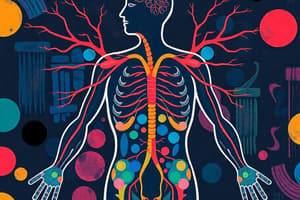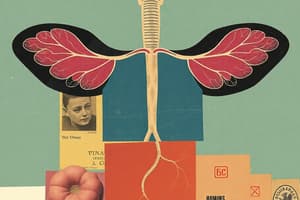Podcast
Questions and Answers
What could be a potential complication of untreated hyperthyroidism?
What could be a potential complication of untreated hyperthyroidism?
- Cerebrovascular accident
- Heart failure (correct)
- Hypoglycemia
- Kidney stones
Which laboratory test is essential for diagnosing type 2 diabetes mellitus?
Which laboratory test is essential for diagnosing type 2 diabetes mellitus?
- Complete blood count
- Hemoglobin A1c (correct)
- Liver function test
- Thyroid function test
Which reflex is assessed to evaluate the integrity of the nervous system in patients with decreased consciousness?
Which reflex is assessed to evaluate the integrity of the nervous system in patients with decreased consciousness?
- Gag reflex
- Corneal reflex (correct)
- Pupillary response
- Knee jerk reflex
What is the primary objective of non-pharmacological nursing care in managing chronic diseases?
What is the primary objective of non-pharmacological nursing care in managing chronic diseases?
In glaucoma, which type is characterized by a gradual increase in intraocular pressure without any symptoms?
In glaucoma, which type is characterized by a gradual increase in intraocular pressure without any symptoms?
What is the primary function of hormone receptors on target cells?
What is the primary function of hormone receptors on target cells?
Which of the following is NOT a common clinical manifestation of diabetes mellitus?
Which of the following is NOT a common clinical manifestation of diabetes mellitus?
Which type of diabetes mellitus is characterized by insufficient insulin production?
Which type of diabetes mellitus is characterized by insufficient insulin production?
What is a common neuropeptide involved in pain modulation?
What is a common neuropeptide involved in pain modulation?
Which condition is characterized by excess growth hormone leading to abnormal growth patterns?
Which condition is characterized by excess growth hormone leading to abnormal growth patterns?
Which feedback mechanism is typically involved in maintaining homeostasis of thyroid hormones?
Which feedback mechanism is typically involved in maintaining homeostasis of thyroid hormones?
What type of pain syndrome includes symptoms such as burning pain and swelling, often following an injury?
What type of pain syndrome includes symptoms such as burning pain and swelling, often following an injury?
Which of the following is a management strategy for chronic conditions like diabetes mellitus?
Which of the following is a management strategy for chronic conditions like diabetes mellitus?
Which of the following are major clinical manifestations of multiple sclerosis?
Which of the following are major clinical manifestations of multiple sclerosis?
What is a common treatment approach for managing myasthenia gravis?
What is a common treatment approach for managing myasthenia gravis?
Which type of edema is characterized by an increase in extracellular fluid due to blood-brain barrier disruption?
Which type of edema is characterized by an increase in extracellular fluid due to blood-brain barrier disruption?
What distinguishes acute otitis media from benign paroxysmal positional vertigo (BPPV)?
What distinguishes acute otitis media from benign paroxysmal positional vertigo (BPPV)?
In diabetes mellitus, what is the primary role of insulin?
In diabetes mellitus, what is the primary role of insulin?
What is the primary feature of amyotrophic lateral sclerosis (ALS)?
What is the primary feature of amyotrophic lateral sclerosis (ALS)?
Which hormonal change is indicative of hyperthyroidism?
Which hormonal change is indicative of hyperthyroidism?
What is a characteristic feature of glaucoma?
What is a characteristic feature of glaucoma?
Flashcards
Hyperthyroidism Manifestations
Hyperthyroidism Manifestations
Visible signs and symptoms of an overactive thyroid gland, including rapid heart rate, weight loss, and nervousness.
Type 2 Diabetes Mellitus (Tests)
Type 2 Diabetes Mellitus (Tests)
Laboratory tests used to diagnose and monitor type 2 diabetes, such as fasting blood glucose and HbA1c.
Increased Intracranial Pressure (ICP) manifestations
Increased Intracranial Pressure (ICP) manifestations
Signs and symptoms resulting from pressure buildup within the skull, including headache, vomiting, and altered levels of consciousness.
Glaucoma Types
Glaucoma Types
Signup and view all the flashcards
Type 2 Diabetes Complications
Type 2 Diabetes Complications
Signup and view all the flashcards
Hormone Action: 3 Factors
Hormone Action: 3 Factors
Signup and view all the flashcards
Hypothalamic-Pituitary Axis
Hypothalamic-Pituitary Axis
Signup and view all the flashcards
Feedback Mechanisms: Example
Feedback Mechanisms: Example
Signup and view all the flashcards
What are the 3 Ps of Diabetes?
What are the 3 Ps of Diabetes?
Signup and view all the flashcards
Diabetes Mellitus: Pathogenesis
Diabetes Mellitus: Pathogenesis
Signup and view all the flashcards
Cushing's Syndrome: Cause
Cushing's Syndrome: Cause
Signup and view all the flashcards
Gigantism vs. Acromegaly
Gigantism vs. Acromegaly
Signup and view all the flashcards
Hyperthyroidism: Causes
Hyperthyroidism: Causes
Signup and view all the flashcards
Trigeminal Neuralgia
Trigeminal Neuralgia
Signup and view all the flashcards
Multiple Sclerosis
Multiple Sclerosis
Signup and view all the flashcards
Parkinson's Disease
Parkinson's Disease
Signup and view all the flashcards
Amyotrophic Lateral Sclerosis (ALS)
Amyotrophic Lateral Sclerosis (ALS)
Signup and view all the flashcards
Guillain-Barré Syndrome
Guillain-Barré Syndrome
Signup and view all the flashcards
Cerebral Edema
Cerebral Edema
Signup and view all the flashcards
Epidural Hematoma
Epidural Hematoma
Signup and view all the flashcards
Glaucoma
Glaucoma
Signup and view all the flashcards
Study Notes
Endocrine Conditions
- Study the characteristics and functions of hormones, considering them as chemical messengers. Focus on 4 key aspects.
- Understand factors affecting how target cells respond to hormones. Apply this knowledge to clinical scenarios, and address how hormone deficiencies manifest. Memorize 3 key details.
- Learn about hormone-receptor interactions, specifically cell surface receptors and intracellular receptor complexes.
- Investigate hypothalamic-pituitary-organ pathways. Review figure 40-3.
- Study feedback mechanisms related to hormones. Use specific examples to apply this clinically. Focus on thyroid hormones, follicle-stimulating hormone, and ovum development.
- Examine different types of diabetes mellitus. Learn about the pathogenesis of each type.
- Study diagnostic tests for diabetes mellitus, highlighting the significance of each.
- Explore clinical manifestations of diabetes mellitus, focusing on the 3Ps (polyuria, polydipsia, polyphagia) and seizures/coma.
- Understand microvascular and macrovascular complications. Review how to educate patients about these complications.
- Examine lab criteria for diabetes mellitus, including chart 41-4.
- Study Cushing syndrome, covering its causes.
Neurological Conditions
- Study neurons and action potentials, including synaptic transmission, messenger molecules, excitatory and inhibitory postsynaptic potentials, and neurotransmitters (amino acids, neuropeptides, monoamines).
- Differentiate between post-herpetic neuralgia, migraine headache, complex regional pain syndrome, and trigeminal neuralgia.
- Review deep pain in children.
- Assess and manage pain in children with myasthenia gravis.
- Examine the etiology, pathogenesis, clinical manifestations, diagnosis, and treatment of myasthenia gravis, also looking at Figures 15-7.
- Differentiate multiple sclerosis, Guillain-Barré syndrome, and myasthenia gravis.
- Examine cerebellar damage.
- Research Parkinson's disease, including its etiology, pathogenesis, clinical manifestations, treatment (Tx), and review table 15-1 & figure 15-12.
- Study amyotrophic lateral sclerosis (ALS), examining its etiology, pathogenesis, clinical manifestations, and treatment.
- Differentiate between multiple sclerosis, focusing on etiology, pathogenesis, clinical manifestations, course, diagnosis, and treatment.
- Study central cord syndrome and Brown-Sequard syndrome.
Other Conditions
- Study myasthenia gravis (etiology, pathogenesis, clinical manifestations, diagnosis, treatment, and figure 15-7).
- Differentiate between different types of cerebral edema (vasogenic and cytotoxic).
- Review and differentiate the different types of intracranial hematomas (epidural, subdural, intraparenchymal, intraventricular).
- Investigate intraocular pressure and glaucoma. Learn about primary open-angle glaucoma and angle-closure glaucoma, including etiology, manifestations, diagnosis, and treatment.
- Differentiate between acute otitis media, acute vestibular neuronitis, benign paroxysmal positional vertigo (BPPV), Meniere's disease, and vestibular neuronitis.
- Review diabetic retinopathy in detail.
- Understand anterior basilar skull fracture, cerebrospinal fluid leak, and how to assess for CSF leaks.
- Study different combinations of increased or decreased thyroid-stimulating hormone (TSH), serum p3, and serum p4, and relate them to specific disease states.
- Explore hyperthyroidism, including its manifestations, diagnostic tests, pharmacologic and non-pharmacologic management.
- Evaluate type 2 diabetes mellitus and its complications, including microvascular and macrovascular issues.
- Assess the manifestations of increased intracranial pressure, including different levels of consciousness, Glasgow Coma Scale, posturing, various reflexes (oculocephalic, vestibular-ocular, corneal, pupillary, gag, Babinski, etc.).
- Investigate glaucoma, including its etiology, types, diagnosis, treatment, and complications.
Studying That Suits You
Use AI to generate personalized quizzes and flashcards to suit your learning preferences.




